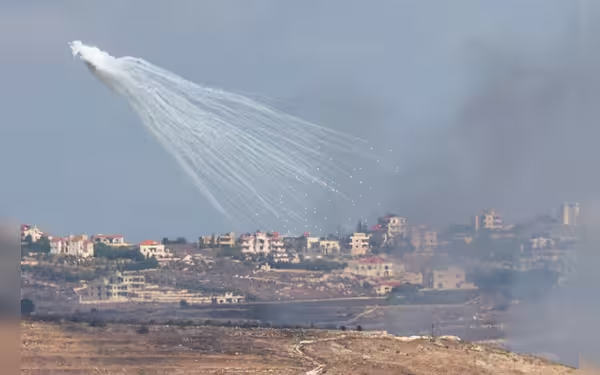Sunday, October 6, 2024 12:24 AM
Israel Bolsters Military Presence in Lebanon Following Iranian Missile Strikes
- Israel deploys infantry and armored units in southern Lebanon.
- Iran warns of stronger retaliation against further Israeli actions.
- Humanitarian crisis escalates with nearly 1,900 casualties in Lebanon.
 Image Credits: brecorder
Image Credits: brecorderIsrael increases military presence in Lebanon after Iranian missile strikes, raising concerns of wider conflict amid humanitarian crisis.
The ongoing conflict in the Middle East has escalated significantly, particularly between Israel and Iran-backed Hezbollah in Lebanon. Recently, Israel has ramped up its military presence in southern Lebanon, responding to a series of missile strikes from Iran. This situation has raised concerns about a potential wider conflict in an already volatile region.
On Wednesday, the Israeli military announced that it was deploying regular infantry and armored units to join ground operations against Hezbollah. This move comes as Israel is already engaged in a fierce battle with Hamas in Gaza. The addition of troops from the 36th Division, including the Golani Brigade and the 188th Armoured Brigade, indicates that Israel's military operations are expanding beyond limited commando raids. The primary goal of these operations is to destroy tunnels and other infrastructure along the border, although the military has stated that there are no plans for a broader assault on major cities like Beirut.
In a significant development, Iran declared that its missile attack on Israel, which was its largest military action against the country, was concluded unless provoked further. Iranian officials have stated that their assault was aimed solely at military facilities, responding to what they described as Israeli aggression in Lebanon and Gaza. Iranian Foreign Minister Abbas Araqchi warned that any further Israeli actions would lead to a stronger retaliation.
Israeli Prime Minister Benjamin Netanyahu has vowed to respond decisively, stating, "Iran made a big mistake tonight - and it will pay for it." The United States has also pledged to support Israel, promising severe consequences for Iran's actions. US Secretary of Defence Lloyd Austin confirmed that the US is prepared to defend its interests in the region, and US Navy warships have already intercepted Iranian missiles aimed at Israel.
As the conflict continues, the humanitarian situation in Lebanon is dire. Nearly 1,900 people have lost their lives, and over 9,000 have been injured in the cross-border fighting, with most casualties occurring in the past two weeks. The Lebanese government is struggling to cope with the fallout from the ongoing violence.
In a related diplomatic move, Israel's foreign minister has barred UN Secretary-General Antonio Guterres from entering the country, citing his failure to unequivocally condemn Iran's missile attack. This decision highlights the growing tensions and the complexities of international relations in the region.
The situation remains fluid, and the potential for a wider conflict looms large. As nations around the world watch closely, the hope is that diplomatic efforts can prevail to prevent further escalation. The people of the Middle East, caught in the crossfire, deserve peace and stability, and it is crucial for global leaders to work towards a resolution that prioritizes human life over political agendas.













